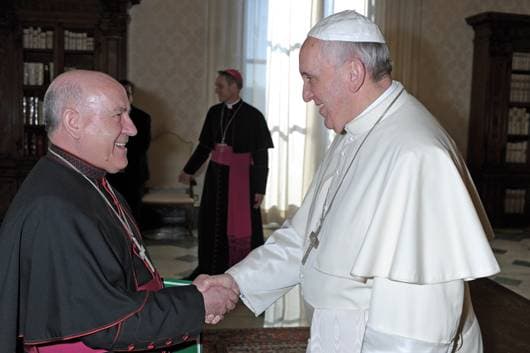ROME – A Spanish archbishop has been cleared by a local court on charges of hacking an ex-employee’s WhatsApp account, on the grounds that the computer was owned by the archdiocese and going into the account was the only way to establish whether the employee had leaked confidential information.
Archbishop Vicente Jiménez of Zaragoza released a statement on May 6 indicating that the court had found his actions “legitimate, justified, proportional and appropriate,” in authorizing an archdiocesan official to access the employee’s WhatsApp data.
According to the statement, there is no recourse against the court’s finding.
Media reports suggest the ex-employee, a formal notary of an ecclesiastical tribunal in the archdiocese named María del Carmen Amador Gil, was suspected of leaking confidential information from church proceedings, and Jiménez agreed that the only way to get to the bottom of the charges was to determine what information was on the computer used by the employee.
When Amador learned her personal WhatsApp account, which she had loaded onto a computer given her by the archdiocese for her work, had been accessed as part of the investigation, she filed a complaint under Spanish law for breach of privacy.
On March 3, a local court held a hearing to consider the actions of Jiménez, the diocesan treasurer and a computer expert, who argued that accessing the WhatsApp account was the only way to complete the investigation into suspicions that Amador had leaked “defamatory information” about people involved in church cases, and that because the computer belonged to the archdiocese, Amador had no expectation of privacy.
In addition, the archdiocesan officials testified, the computer was not supposed to be used for functions outside of work.
Jiménez’s May 6 statement also lamented the fact that some Spanish media had reported he was suspected of “espionage,” which, he complained, violated the “deontological” responsibility to “call things by name,” and also failed to respect his “presumption of innocence.”
Yet, the statement said, Jiménez remains convinced that “the truth suffers but does not perish.”
Now 73, Jiménez has been the archbishop of Zaragoza since he was appointed to the post in December 2014 by Pope Francis. He’s been defined as “”a simple, close person, a man of God and of faith, with a well-furnished head” by Cardinal Carlos Osoro Sierra of Madrid.
Of late, Jiménez has been involved in a public dispute with the leftist mayor of Zaragoza, Pedro Santisteve, who believes that ownership of the cathedral and another famous church belongs to the city and not to the church. Apparently the controversy has arisen now because April 8 marked the 30th anniversary of the archdiocese’s formal registration of the second church, and, under Spanish law, if 30 years had passed without anyone else asserting a claim, then ownership could not be contested.
Jiménez has declared the assertion legally “null,” and is fighting off attempts by the city to exert control over the structures. Santisteve is a member of the “Podemus” political party, which is known in Spain for its sometimes anticlerical positions.
WhatsApp, meanwhile, is an instant messaging platform for smartphones that can also be installed on tablets and computers. It claims a user base of over 1 billion people, making it the most popular messaging application in the world.













